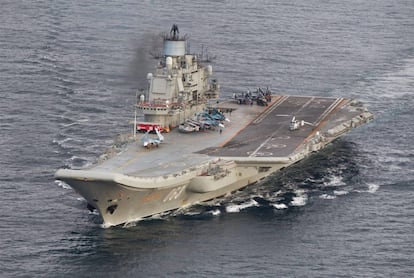Spain cancels permission for Russian warship refueling in Ceuta
The government had been criticized for allowing ships to stop due to likelihood of involvement in Syrian conflict

The Spanish government has canceled the authorization that had been granted to a fleet of Russian warships, headed by the aircraft carrier Admiral Kuznetsov, to make a stop at the Spanish exclave city of Ceuta on its way to the eastern Mediterranean. The ships had been due to refuel and to take on water and supplies at the North African port.
The Russian embassy in Madrid retracted at midday today the request to make a stop
According to a statement from the Office of Diplomatic Information (OID), the Russian embassy in Madrid retracted at midday today the request to make a stop after the Spanish Foreign Ministry requested clarification on whether the three vessels were “going to be taking part in support or conflict actions over the Syrian city of Aleppo.”
Hours earlier, NATO Secretary General Jens Stoltenberg repeated concerns that the fleet could play a support role in a final assault on the Syrian city of Aleppo by troops loyal to the regime of Bashar al-Assad – military action that has been heavily criticized by the European Union.
NATO has been keeping a close eye on the battle group since it sailed out of the Arctic port of Severomorsk several days ago. The fleet is being monitored by two NATO Standing Maritime Groups, the first of which is led by Spanish frigate Almirante Juan de Borbón. The Russian ships were also shadowed by two Spanish patrol boats as they made their way along the Spanish coast and passed through the Strait of Gibraltar on Wednesday morning.
Spain signed EU statement on Russian war crimes in #Aleppo last week; today helps refuel fleet on way to commit more atrocities. Seriously? pic.twitter.com/a0lYtMN3cV
— Guy Verhofstadt (@guyverhofstadt) October 25, 2016
The Russian Navy regularly docks at Ceuta: more than 60 of its vessels have used the port since 2011. It provides a boost to the local economy, but the policy has drawn criticism from right-wing groups in the United Kingdom and the United States.
The Spanish Foreign Ministry spokesperson said on Tuesday that permission for such stops was granted on a case-by-case basis, depending on the nature of the ship involved and any possible security risks.
But on this occasion, the authorization had generated controversy. The leader of the Liberal group in the European parliament, Guy Verhofstadt, tweeted: “Spain signed EU statement on Russian war crimes in #Aleppo last week; today helps refuel fleet on way to commit more atrocities. Seriously?”
English version by Simon Hunter and George Mills.
Tu suscripción se está usando en otro dispositivo
¿Quieres añadir otro usuario a tu suscripción?
Si continúas leyendo en este dispositivo, no se podrá leer en el otro.
FlechaTu suscripción se está usando en otro dispositivo y solo puedes acceder a EL PAÍS desde un dispositivo a la vez.
Si quieres compartir tu cuenta, cambia tu suscripción a la modalidad Premium, así podrás añadir otro usuario. Cada uno accederá con su propia cuenta de email, lo que os permitirá personalizar vuestra experiencia en EL PAÍS.
¿Tienes una suscripción de empresa? Accede aquí para contratar más cuentas.
En el caso de no saber quién está usando tu cuenta, te recomendamos cambiar tu contraseña aquí.
Si decides continuar compartiendo tu cuenta, este mensaje se mostrará en tu dispositivo y en el de la otra persona que está usando tu cuenta de forma indefinida, afectando a tu experiencia de lectura. Puedes consultar aquí los términos y condiciones de la suscripción digital.








































